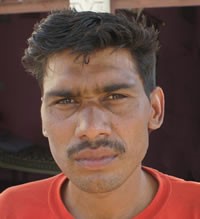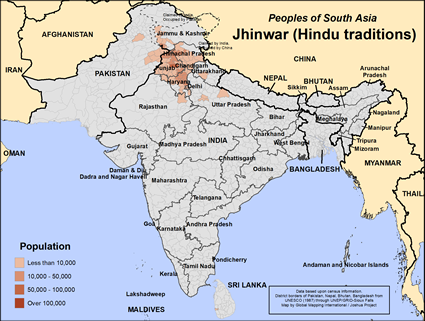Jhinwar (Hindu traditions) in Pakistan

Photo Source:
Copyrighted © 2026
Isudas All rights reserved. Used with permission |

Map Source:
People Group data: Omid. Map geography: UNESCO / GMI. Map Design: Joshua Project.
|
| People Name: | Jhinwar (Hindu traditions) |
| Country: | Pakistan |
| 10/40 Window: | Yes |
| Population: | 2,000 |
| World Population: | 593,000 |
| Primary Language: | Punjabi, Western |
| Primary Religion: | Hinduism |
| Christian Adherents: | 0.00 % |
| Evangelicals: | 0.00 % |
| Scripture: | New Testament |
| Ministry Resources: | Yes |
| Jesus Film: | Yes |
| Audio Recordings: | Yes |
| People Cluster: | South Asia Hindu - other |
| Affinity Bloc: | South Asian Peoples |
| Progress Level: |
|
Introduction / History
The Jhinwar people live in India and Pakistan. At the Partition of 1947 most of the Hindu Jhinwar moved to India and the Muslim Jhinwar went to Pakistan, yet some Hindu Jhinwars remained in Pakistan. There also a sizable Sikh community among the Jhinwar. The traditional occupation of the Jhinwar has been related to water, in fishing, boating and as water carriers. Others work in agriculture as farmers, day laborers or in grinding grain.
What Are Their Lives Like?
Some Jhinwar work in business as traders in fish and mutton. Many urban Jhinwar work in factories and in construction. Some rural Jhinwar make baskets for a living. Many of the Jhinwar are now day laborers in agriculture. Women carry water to villages and work as domestics. Illiteracy is a major issue for the Jhinwar especially among the women and girls. The gospel will need to be presented to the Jhinwar in oral and visual forms. The two main languages of the Jhinwar in Pakistan are Western Punjabi and Urdu. The New Testament and the JESUS Film are available in these languages. As Hindus, they will not eat beef. Most Jhinwar did not eat pork so as to not offend their Muslim neighbors. They marry as adults. One marriage to one spouse is their normal pattern. Divorce and remarriage are not favorably accepted by them. Families arrange marriages within their group. Sons inherit property upon their father's death.
What Are Their Beliefs?
The small group of Jhinwar in India practice Hinduism, the ancient religion of India. They worship and serve the gods of the Hindu pantheon. Hindus believe that by performing rituals and good works that they will attain moksha or freedom from the endless cycle of birth, death and rebirth. The Jhinwar visit Hindu temples and offer prayers, food, flowers, and incense to their gods in hopes of gaining protection and benefits. They do not have a personal or familial relationship with their gods as Christians do. There are many forms of Hinduism, each with its own deities and beliefs. The main yearly holidays of the Jhinwar people are Holi, the festival of colors and the start of spring, Diwali, the festival of lights, Navratri, the celebration of autumn and Rama Navami, Rama's birthday. Many Hindu Jhinwar in Pakistan also celebrate Muslim holidays. The caste system divides Hindus into four main categories. The lowest communities are outside of the caste system. The Jhinwar fall into the working caste.
What Are Their Needs?
The Hindu Jhinwar of Pakistan would benefit by new job skills and better education for their children. Rural Jhinwar need access to modern medicine and clean water. Most of all the Jhinwar must hear and understand the life-changing message about Jesus Christ. He alone can forgive their sins and grant them eternal life.
Prayer Points
Pray that God's Holy Spirit will open new doors in hearts to positive changes among Jhinwar people. Pray for the Jhinwar people to have a Holy Spirit driven hunger for spiritual truth that will lead them to Jesus Christ and the Bible. Pray for the Lord to thrust out new workers who will lovingly stick with these people until they have a church planting movement.